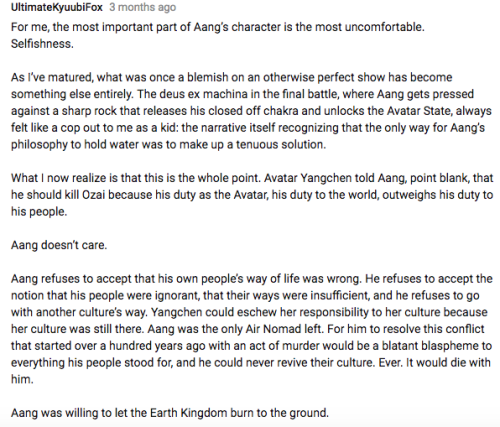ymfingsteadilyon:shieldmaiden19:sophelstien:why is this youtube comment the best analysis of what i’
ymfingsteadilyon:shieldmaiden19:sophelstien:why is this youtube comment the best analysis of what i’ve ALSO thought was a cop-out for the past ten years Oh this is brilliant. What an important character analysis. [Image description: Screenshot of a Youtube comment by Ultimate Kyuubi Fox.“For me, the most important part of Aang’s character is the most uncomfortable. Selfishness.As I’ve matured, what was once a blemish on an otherwise perfect show has become something else entirely. The deus ex machina in the final battle, where Aang gets pressed against a sharp rock that releases his closed off chakra and unlocks the Avatar State, always felt like a cop out to me as a kid: the narrative itself realizing that the only way for Aang’s philosophy to hold water was to make up a tenuous solution.What I now realize is that this is the whole point. Avatar Yangchen told Aang, point blank, that he should kill Ozai because his duty as the Avatar, his duty to the world, outweighs his duty to his people.Aang doesn’t care. Aang refuses to accept that his own people’s way of life was wrong. He refuses to accept the notion that his people were ignorant, that their ways were insufficient, and he refuses to go with another people’s way. Yangchen could eschew her responsibility to her culture because her culture was still there. Aang was the only Air Nomad left. For him to resolve this conflict that started over a hundred years ago with an act of murder would be a blatant blaspheme to everything his people stood for, and he could never revive their culture. Ever. It would die with him. Aang was wiling to let the Earth Kingdom burn to the ground.To prove that his people didn’t deserve the same.A commonly referenced piece of insight from the fan community is the fact that the room where Aang finds Monk Gyatso’s skeleton, there are five suits of Fire Nation armor limp on the ground as well. The theory being that Gyatso used all of his bending prowess to suck the air out of the room and kill them.I think he did.When the Southern Air Temple was raised, the Air Nomads met the Fire Nation at their game. Aang, resolute, refused to reach out his hand the same way.And the universe itself respected that.This is symbolized in color when Aang uses energybending to remove Ozai’s firebending. The red from Ozai overtakes Aang’s entire body until all that remains is the skin of Aang’s eyelid. The Fire Nation’s moral depravity consumed Air Nomad culture and philosophy and belief. Then, right at the end, right when every single piece of it has been corrupted and dead. Aang.Pushing forward, resolute, and overtaking Ozai with blue.The universe respected Aang’s conviction and allowed him to win.And that is selfish. Aang put his people before the world. He put existing lives up for slaughter to prove the dead didn’t deserve it.The key difference being that Aang’s selfishness previously had always been selfishness for his personal sake – selfishness to escape responsibility, selfishness to run away from his fears, selfishness to keep his friends from abandoning him.In the final battle, Aang is selfish for his People. Where he once was selfish in opposition to them.That’s why he wins.This aspect of Aang‘s character is vital to who he is. And it’s not pretty. It’s the reason so many fans were uncomfortable with what we learned about his kids in Legend of Korra. He prioritized Tenzin over his other non-Airbender kids. It wasn’t out of spite, or overt cruelty, or intended neglect. He simply prioritized the survival of his people and their culture above all else.Of course he does.That’s what he’s been doing since he fought Ozai.That’s his character.That’s how he won.”] -- source link
Tumblr Blog : sophelstien.tumblr.com
#long post


